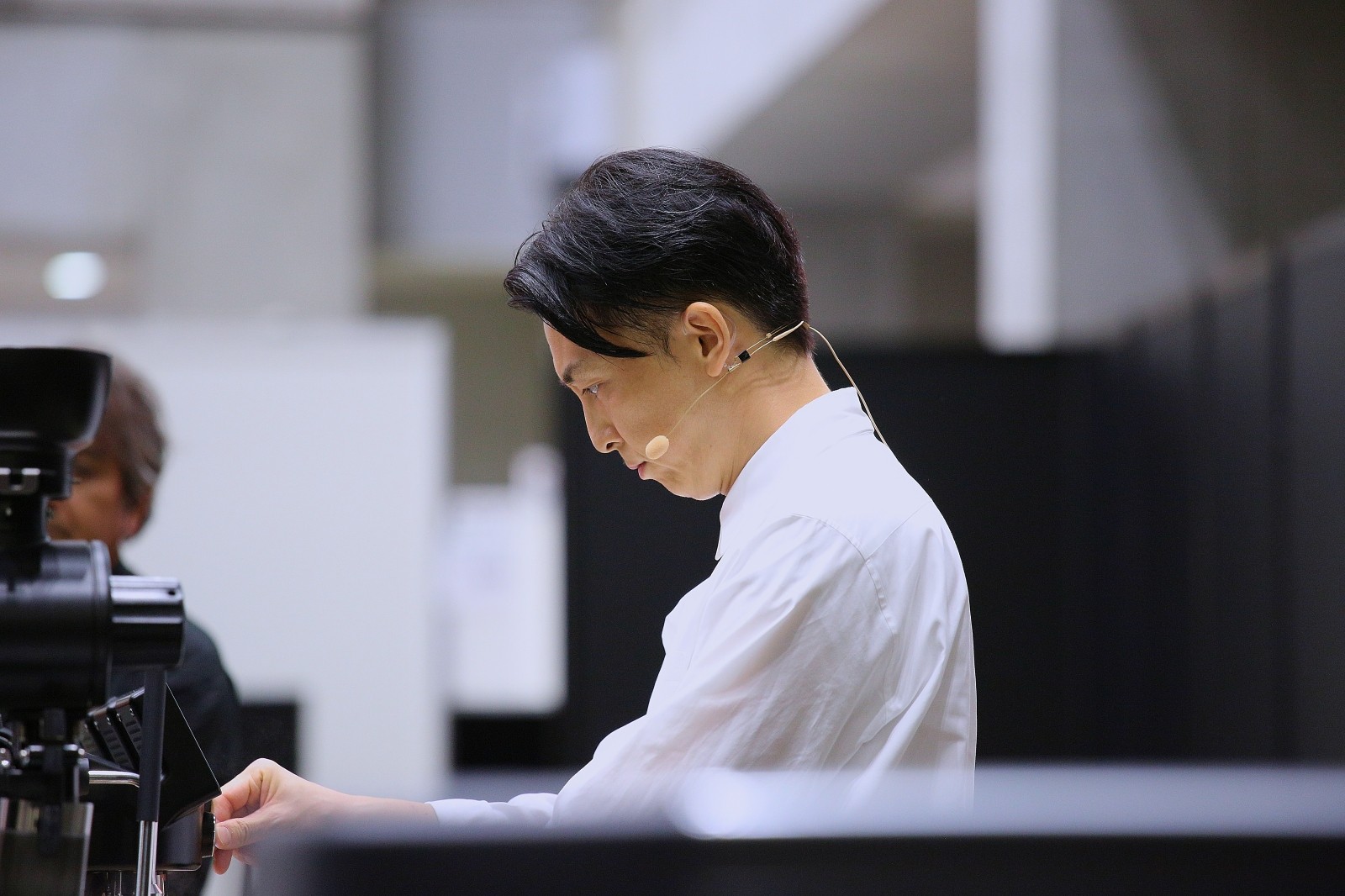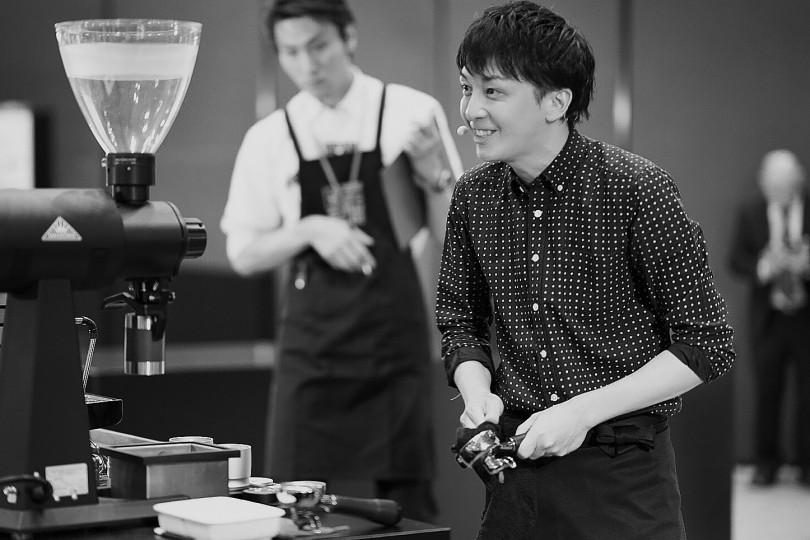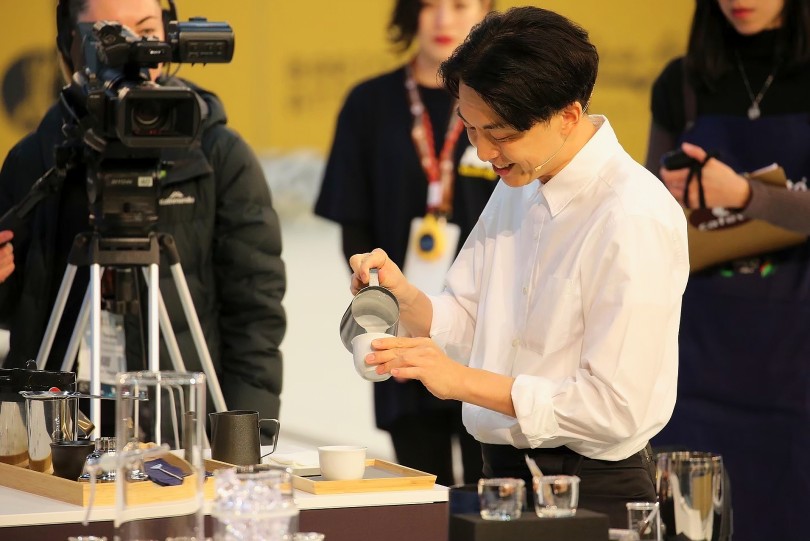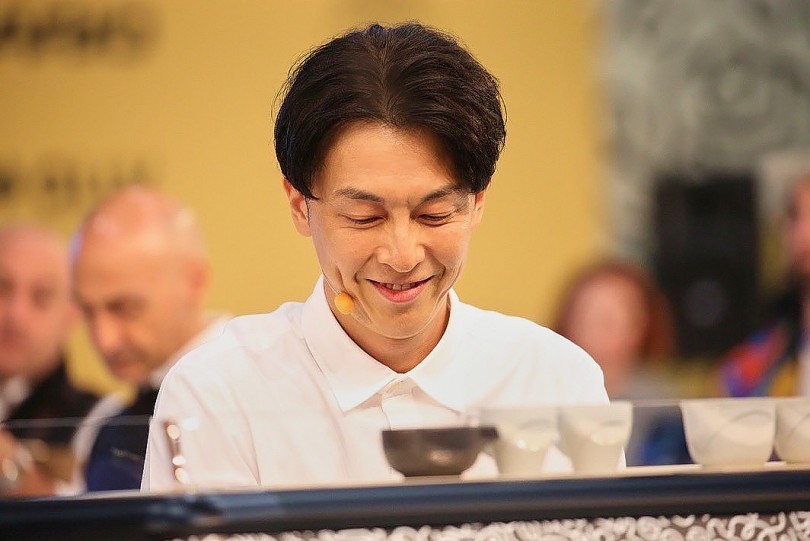Challenge for World's Best: Becoming a Three-Time Champion at the Japan Barista Championship

競技会と普段のバリスタの仕事は繋がっている。さまざまな意見があることは承知しているが、石谷貴之はそう信じてチャレンジを続けてきた。バリスタ競技で世界を目指す中で得ることができる、かけがえのない経験は、コーヒーを楽しむすべての人にあまねく伝えるべきことなはずだ。
エスプレッソとの出会い
コーヒーが苦手だった石谷貴之がバリスタへの道を歩み始めたのは、東京・表参道のカフェにサービスを勉強しようと入ったことがきっかけだった。接客の仕事が好きで、それを突き詰めたいと考えていたのだった。しかし、ここでエスプレッソに初めて触れた彼は、なぜ自分が淹れたエスプレッソがおいしくないのか、おいしいエスプレッソとはどんなものなのか、探求を始めることになる。
バリスタという言葉も一般にはあまり認知されていない当時、本に掲載されているカフェを片っ端から巡るなど、少ない情報を手がかりに練習に励む日々。
その過程で知ったバリスタの競技会「ジャパンバリスタチャンピオンシップ」にすぐ出場を決めたのも、自身の技術を向上させるためだった。
苦手だったコーヒー
そもそもコーヒーを飲む習慣がなく、むしろ嫌いな部類だったという石谷貴之は、コーヒーについてとても客観的に捉えていた部分があるのだろう。なぜエスプレッソがおいしくないのか、そこから始まった探求は、どれだけ練習してもすぐに解決されるものではなかった。
しかし、その練習量が功を奏して、ジャパンバリスタチャンピオンシップに初出場した2007年から決勝に残り6位入賞という好成績を残す。そして、この舞台が技術の一つの基準となり、さらにそれを高めるべく、練習に励んだ。

転機となった独立
カフェに勤めながら、毎年ジャパンバリスタチャンピオンシップに出場し、2009年にはついに準優勝を果たした。そんな石谷貴之の転機となったのが2012年、ひとりのバリスタとして独立したことだった。
企業や店舗には属さず、プロのバリスタとして生きる。そんな道があってもいいのではないか。周囲の人々のサポートを受けながら、新たな挑戦がスタートした。
競技会への準備を行う環境も一変した。
いつでもエスプレッソマシンに触れられる状況から、協力してくれるマシンのメーカーを訪れ、1週間に1回、2時間集中して取り組む。自宅ではイメージトレーニング。練習もそんなふうに工夫して行うこととなった。
独立したからといって1人ではなく、周囲の人たちに助けられて初めて、競技を行うことができる。20代は自身のために競技会に出場していたが、30代となって独立した後、競技会で周りのサポートしてくれる人たちになんとか恩返ししたいという気持ちに変わっていた。
ひとりのバリスタとして、チャレンジする意義
TAKA ISHITANIとしての活動を始めて以降も毎年、ジャパンバリスタチャンピオンシップに挑戦し続けた石谷貴之。バリスタ競技は、基本的にエスプレッソマシン以外は自分で豆からカップまで準備しなければならない。個人で出場するには少しハードルが高いのは事実だ。
ここで競技内容について簡単に触れておこう。
ジャパンバリスタチャンピオンシップは、世界大会であるワールドバリスタチャンピオンシップの国内予選を兼ねている。そのため、レギュレーションは共通している。
15分の制限時間内に、エスプレッソを4杯、ミルクビバレッジを4杯、シグニチャードリンクと呼ばれるアレンジドリンクを4杯、それぞれジャッジに対して提供し、味覚、技術、創造性、プレゼンテーションのクオリティを競う。
この競技会で上位に残るには、卓越した技術だけでなく、多くの要素が必要となり、国内大会では、バリスタの教育に力を入れる企業に所属するバリスタたちが目立った成績を残すことが多くなっていた。
そのために若いバリスタたちが出場を断念することもあり、所属がなくても出れるし、上位に入賞もできるということを示すため、出場を続けた。

いよいよ世界の舞台へ
自分のための挑戦からサポートしてくれる人たちへの恩返しとなった競技。所属がなくなると、これまで以上にその人のためにコーヒーを淹れることが価値を持つようになった。
たくさんのサポートしてくれる人たちや、コーヒーを飲んでくれる人たち。そうした人々を思うことで力を得たTAKA ISHITANIは、ついに2017年、ジャパンバリスタチャンピオンシップで悲願の優勝を飾る。
そして世界への挑戦権を得たのだった。
ワールドバリスタチャンピオンシップ(World Barista Championship)。バリスタ世界一の座をかけて年に一度開催される、もっとも権威ある競技会。
世界の60以上の国・地域で行われる国内大会のチャンピオンが出場し、頂点を目指して戦う舞台だ。世界中から集まった公認審査員が、提供された飲み物の味だけでなく、創造性、技術力、そして全体的なプレゼンテーションを評価する。
世界で得た経験を伝える存在に
国内大会から半年のブランクがある世界大会には、同じ豆、同じプレゼンでは戦えない。しかも当然英語でのプレゼンテーションとなる。大会への準備でもっとも時間をかけるのはプレゼンテーションの内容だ。ジャパンバリスタチャンピオンシップでも、その最初のフレーズにたどり着くまで、1、2ヶ月をかける。
世界大会への準備も時間をかけて行った。
そして出場したWorld Barista Championship 2018。結果から言えば、準決勝に残ることができたが、残念ながら11位という順位に終わった。
しかし何より感銘を受けたのが、各国から集まったトップバリスタたちのオープンな姿勢だ。戦う相手でありながら、ともにコーヒーの世界をより高みに導くための切磋琢磨する仲間。そんな雰囲気のバックヤードでは、皆が情報を交換し合い、そこには大きな学びがあった。
最先端の情報を得て、コーヒーを楽しむ人に伝えていく。
そんなバリスタの仕事を再認識した経験は、その後の仕事にも生かされている。

世界一への挑戦
この得がたい経験を経て、ジャパンバリスタチャンピオンシップで2度目の優勝、そして出場したWorld Barista Championship 2022で、目標としていた決勝進出を果たす。順位は4位。TOP3に手が届くところまで来ていた。もう一度世界へチャレンジするために、ジャパンバリスタチャンピオンシップで3度目の優勝を果たしたTAKA ISHITANI。
世界の舞台でさらに上を目指す。
しかし、本人は気負いなく、世界大会への準備期間を新たなコーヒーの学びを得る時間として、思い切り楽しむという。
そうして組み上がったプレゼンテーションが、結果を引き寄せることになるはずだ。
TAKA ISHITANIは、コーヒーが苦手なインディペンデントのバリスタである。他に類を見ないアイデンティティを持つ、石谷貴之のコーヒーには、誰にも真似できない価値がある。
そして、彼だからこそ伝えられるコーヒーの価値・バリスタの価値が存在する。
それは世界の舞台で評価されるはずだ。
ワールドバリスタチャンピオンシップとは?
ワールドバリスタチャンピオンシップ (WBC) は、ワールドコーヒーイベント (WCE) が主催する権威ある国際コーヒー競技会。世界中の地域予選を勝ち抜いたバリスタたちが集い、その年のバリスタ世界チャンピオンが決定される。スペシャルティコーヒーの隆盛ととも、2000年にスタート。毎年場所を変えて開催されており、2024年は韓国・釜山で行われた。
ワールドバリスタチャンピオンシップ (WBC) は、ワールドコーヒーイベント (WCE) が主催する権威ある国際コーヒー競技会。世界中の地域予選を勝ち抜いたバリスタたちが集い、その年のバリスタ世界チャンピオンが決定される。スペシャルティコーヒーの隆盛ととも、2000年にスタート。毎年場所を変えて開催されており、2024年は韓国・釜山で行われた。
The work of a barista in competitions is connected to their everyday tasks. While there are various opinions on this, Takayuki Ishitani firmly believes it and has continued to take on challenges. The invaluable experiences gained while aiming for the world in barista competitions should be shared with everyone who enjoys coffee.
Encounter with Espresso
Takayuki Ishitani, who initially disliked coffee, began his journey as a barista when he entered a cafe in Omotesando, Tokyo, to study service. He loved customer service and wanted to pursue it to the fullest.However, upon encountering espresso for the first time, he started to explore why the espresso he made wasn't delicious and what a good espresso should be like.
At a time when the term "barista" was not widely recognized, he practiced tirelessly, using the limited information available, such as visiting cafes listed in books. It was during this process that he decided to participate in the Japan Barista Championship to improve his skills.
Disliked Coffee
Takayuki Ishitani, who originally had no habit of drinking coffee and even disliked it, likely had a very objective view of coffee.His quest to understand why espresso wasn't delicious did not yield immediate results, no matter how much he practiced.
However, his hard work paid off, and from his first appearance in the Japan Barista Championship in 2007, he made it to the finals and finished in 6th place. This stage became a benchmark for his skills, and he practiced even more to enhance them.

Turning Point: Becoming Independent
While working at a cafe, he continued to participate in the Japan Barista Championship every year, and in 2009, he finally achieved second place.The turning point for Takayuki Ishitani came in 2012 when he decided to become an independent barista.
Living as a professional barista without belonging to any company or store. With the support of those around him, a new challenge began.
The environment for preparing for competitions changed drastically. From always being able to touch an espresso machine, he now visited manufacturers who cooperated with him, focusing for two hours once a week. At home, he did image training. He practiced creatively in such ways.
Being independent did not mean he was alone; it was only with the help of those around him that he could compete. In his 20s, he competed for himself, but after becoming independent in his 30s, his motivation shifted to repaying the people who supported him in the competitions.
The Significance of Challenging as a Solo Barista
Even after starting his activities as TAKA ISHITANI, Takayuki Ishitani continued to challenge the Japan Barista Championship every year.In barista competitions, except for the espresso machine, you have to prepare everything from the beans to the cups yourself. It is true that participating as an individual has a high barrier.
Let me briefly touch on the competition content here.
The Japan Barista Championship doubles as a domestic qualifying round for the World Barista Championship. Therefore, the regulations are the same.
Within the 15-minute time limit, competitors serve four espressos, four milk beverages, and four signature drinks to the judges, competing in taste, technique, creativity, and presentation quality.
To place high in this competition, not only outstanding skills but many other elements are required, and in domestic competitions, baristas belonging to companies that focus on barista education often achieve notable results.
For this reason, many young baristas give up participating, but he continued to participate to show that even without affiliation, it is possible to compete and achieve high rankings.

Finally, to the World Stage
The competition, which began as a challenge for himself, turned into a way to repay those who supported him.Without affiliation, the value of making coffee for someone became even more significant.
With the support of many people and those who drink his coffee in mind, TAKA ISHITANI finally achieved his long-awaited victory in the Japan Barista Championship in 2017.
He earned the right to challenge the world.
The World Barista Championship (WBC), the most prestigious competition held annually to determine the best barista in the world.
Champions from domestic competitions held in over 60 countries and regions around the world gather to compete for the top spot. Authorized judges from around the world evaluate not only the taste of the beverages provided but also creativity, technical skills, and overall presentation.
Becoming Someone Who Conveys Experiences Gained Worldwide
With a half-year gap between the domestic competition and the world competition, he couldn't compete with the same beans and presentation. Naturally, the presentation had to be in English.The most time-consuming part of preparing for the competition is the presentation content. Even for the Japan Barista Championship, it takes one to two months just to come up with the initial phrase.
He also took time to prepare for the world competition.
In the World Barista Championship 2018, although he reached the semifinals, he finished in 11th place.
However, what impressed him the most was the openness of the top baristas from various countries. While they were competitors, they were also companions striving to elevate the coffee world together. In the backstage atmosphere, everyone exchanged information, and there was a lot to learn.
He realized the importance of obtaining the latest information and conveying it to people who enjoy coffee.
This experience has been utilized in his subsequent work.

Challenge for World No.1
After gaining such valuable experience, he won the Japan Barista Championship for the second time and reached the finals of the World Barista Championship 2022, achieving his goal. He finished in 4th place, just short of the top 3.To challenge the world once again, TAKA ISHITANI won the Japan Barista Championship for the third time.
Aiming higher on the world stage.
However, he is relaxed and enjoys the preparation period for the world competition as a time to gain new coffee knowledge.
He believes that the presentation built in this way will lead to good results.
TAKA ISHITANI is an independent barista who initially disliked coffee. His coffee, with a unique identity that cannot be imitated by anyone, has irreplaceable value.
Only he can convey the value of coffee and baristas.
This will surely be recognized on the world stage.
What is the World Barista Championship?
The World Barista Championship (WBC) is a prestigious international coffee competition organized by World Coffee Events (WCE). Baristas who have won regional preliminaries worldwide gather to determine the world barista champion of the year. Started in 2000 with the rise of specialty coffee, it is held in a different location every year, and in 2024, it was held in Busan, South Korea.
The World Barista Championship (WBC) is a prestigious international coffee competition organized by World Coffee Events (WCE). Baristas who have won regional preliminaries worldwide gather to determine the world barista champion of the year. Started in 2000 with the rise of specialty coffee, it is held in a different location every year, and in 2024, it was held in Busan, South Korea.
El trabajo de un barista en las competiciones está relacionado con sus tareas cotidianas. Aunque hay diversas opiniones al respecto, Takayuki Ishitani lo cree firmemente y ha continuado enfrentando desafíos. Las experiencias invaluables obtenidas al aspirar al mundo en las competiciones de baristas deben compartirse con todos los que disfrutan del café.
Encuentro con el Espresso
Takayuki Ishitani, quien inicialmente no gustaba del café, comenzó su viaje como barista cuando ingresó a un café en Omotesando, Tokio, para estudiar servicio. Le encantaba la atención al cliente y quería llevarla al máximo.Sin embargo, al encontrarse con el espresso por primera vez, comenzó a explorar por qué el espresso que él preparaba no era delicioso y cómo debía ser un buen espresso.
En una época en que el término "barista" no era ampliamente reconocido, practicaba incansablemente, utilizando la información limitada disponible, como visitar cafés mencionados en libros. Durante este proceso, decidió participar en el Campeonato de Baristas de Japón para mejorar sus habilidades.
No le gustaba el café
Takayuki Ishitani, quien originalmente no tenía el hábito de beber café e incluso lo detestaba, probablemente tenía una visión muy objetiva del café.Su búsqueda para entender por qué el espresso no era delicioso no dio resultados inmediatos, sin importar cuánto practicara.
Sin embargo, su arduo trabajo dio sus frutos, y desde su primera aparición en el Campeonato de Baristas de Japón en 2007, llegó a la final y terminó en sexto lugar. Este escenario se convirtió en un punto de referencia para sus habilidades, y practicó aún más para mejorarlas.

Punto de inflexión: Convertirse en independiente
Mientras trabajaba en un café, continuó participando cada año en el Campeonato de Baristas de Japón, y en 2009, finalmente logró el segundo lugar.El punto de inflexión para Takayuki Ishitani llegó en 2012 cuando decidió convertirse en un barista independiente.
Vivir como un barista profesional sin pertenecer a ninguna empresa o tienda. Con el apoyo de quienes lo rodeaban, comenzó un nuevo desafío.
El entorno para prepararse para las competiciones cambió drásticamente. De siempre poder tocar una máquina de espresso, ahora visitaba a los fabricantes que cooperaban con él, enfocándose durante dos horas una vez por semana. En casa, hacía entrenamiento mental. Practicaba creativamente de estas formas.
Ser independiente no significaba estar solo; solo con la ayuda de quienes lo rodeaban podía competir. En sus 20 años, competía para sí mismo, pero después de independizarse en sus 30 años, su motivación cambió a retribuir a las personas que lo apoyaban en las competiciones.
El significado de desafiar como un barista independiente
Incluso después de comenzar sus actividades como TAKA ISHITANI, Takayuki Ishitani continuó desafiando cada año el Campeonato de Baristas de Japón.En las competiciones de baristas, excepto la máquina de espresso, uno debe preparar todo desde los granos hasta las tazas por sí mismo. Es cierto que participar como individuo tiene una barrera alta.
Permítanme tocar brevemente el contenido de la competición aquí.
El Campeonato de Baristas de Japón también sirve como una ronda de clasificación nacional para el Campeonato Mundial de Baristas. Por lo tanto, las regulaciones son las mismas.
Dentro del límite de tiempo de 15 minutos, los competidores deben servir cuatro espressos, cuatro bebidas con leche y cuatro bebidas de autor a los jueces, compitiendo en sabor, técnica, creatividad y calidad de la presentación.
Para colocarse en los primeros lugares en esta competición, no solo se requieren habilidades sobresalientes, sino también muchos otros elementos, y en las competiciones nacionales, los baristas pertenecientes a empresas que se centran en la educación de baristas a menudo logran resultados notables.
Por esta razón, muchos baristas jóvenes renuncian a participar, pero él continuó participando para mostrar que incluso sin afiliación, es posible competir y lograr altas clasificaciones.

Finalmente, al escenario mundial
La competición, que comenzó como un desafío para sí mismo, se convirtió en una forma de retribuir a quienes lo apoyaban.Sin afiliación, el valor de hacer café para alguien se volvió aún más significativo.
Con el apoyo de muchas personas y pensando en quienes beben su café, TAKA ISHITANI finalmente logró su tan esperada victoria en el Campeonato de Baristas de Japón en 2017.
Ganó el derecho a desafiar al mundo.
El Campeonato Mundial de Baristas (WBC), la competición más prestigiosa que se celebra anualmente para determinar al mejor barista del mundo.
Campeones de competiciones nacionales realizadas en más de 60 países y regiones de todo el mundo se reúnen para competir por el primer lugar. Los jueces autorizados de todo el mundo evalúan no solo el sabor de las bebidas proporcionadas, sino también la creatividad, las habilidades técnicas y la presentación general.
Convertirse en alguien que transmite experiencias obtenidas a nivel mundial
Con una brecha de medio año entre la competición nacional y la mundial, no podía competir con los mismos granos y presentación. Naturalmente, la presentación tenía que ser en inglés.La parte más laboriosa de prepararse para la competición es el contenido de la presentación. Incluso para el Campeonato de Baristas de Japón, lleva uno o dos meses solo llegar a la frase inicial.
También tomó tiempo para prepararse para la competición mundial.
En el Campeonato Mundial de Baristas 2018, aunque llegó a las semifinales, terminó en el puesto 11.
Sin embargo, lo que más le impresionó fue la apertura de los mejores baristas de varios países. Aunque eran competidores, también eran compañeros que se esforzaban por elevar el mundo del café juntos. En el ambiente de los bastidores, todos intercambiaban información y había mucho que aprender.
Se dio cuenta de la importancia de obtener la información más reciente y transmitirla a las personas que disfrutan del café.
Esta experiencia ha sido utilizada en su trabajo posterior.

Desafío por ser el número uno del mundo
Después de obtener una experiencia tan valiosa, ganó el Campeonato de Baristas de Japón por segunda vez y alcanzó la final del Campeonato Mundial de Baristas 2022, logrando su objetivo. Terminó en cuarto lugar, a punto de llegar al top 3.Para desafiar al mundo una vez más, TAKA ISHITANI ganó el Campeonato de Baristas de Japón por tercera vez.
Apuntando más alto en el escenario mundial.
Sin embargo, está relajado y disfruta el período de preparación para la competición mundial como un momento para adquirir nuevos conocimientos sobre el café.
Cree que la presentación construida de esta manera conducirá a buenos resultados.
TAKA ISHITANI es un barista independiente que inicialmente no gustaba del café. Su café, con una identidad única que no puede ser imitada por nadie, tiene un valor insustituible.
Solo él puede transmitir el valor del café y los baristas.
Esto seguramente será reconocido en el escenario mundial.
¿Qué es el Campeonato Mundial de Baristas?
El Campeonato Mundial de Baristas (WBC) es una competición internacional de café prestigiosa organizada por World Coffee Events (WCE). Los baristas que han ganado las rondas preliminares regionales de todo el mundo se reúnen para determinar al campeón mundial de baristas del año. Iniciado en 2000 con el auge del café de especialidad, se celebra cada año en una ubicación diferente, y en 2024, se celebró en Busan, Corea del Sur.
El Campeonato Mundial de Baristas (WBC) es una competición internacional de café prestigiosa organizada por World Coffee Events (WCE). Los baristas que han ganado las rondas preliminares regionales de todo el mundo se reúnen para determinar al campeón mundial de baristas del año. Iniciado en 2000 con el auge del café de especialidad, se celebra cada año en una ubicación diferente, y en 2024, se celebró en Busan, Corea del Sur.

